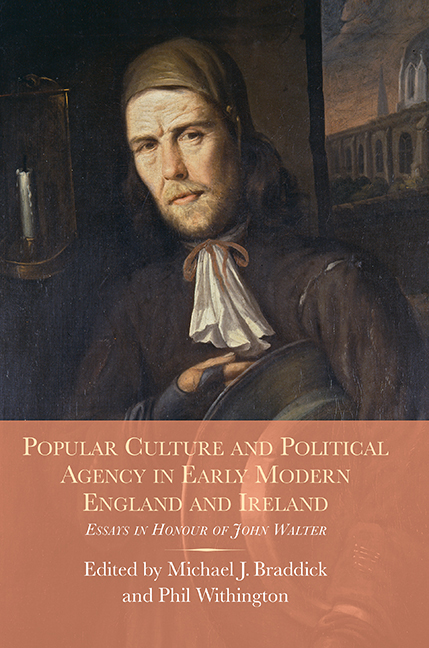 Popular Culture and Political Agency in Early Modern England and Ireland
Popular Culture and Political Agency in Early Modern England and Ireland Book contents
- Frontmatter
- Contents
- List of Illustrations
- List of Contributors
- Acknowledgements
- List of Abbreviations
- Introduction
- 1 John Walter and the social history of early modern England
- 2 Contrasting susceptibility to famine in early fourteenth- and late sixteenth-century England: the significance of late medieval rural social structural and village governmental changes
- 3 The politics of English political economy in the 1620s
- 4 Provision, household management and the moral authority of wives and mothers in early modern England
- 5 Popular senses of past time: dating events in the North Country, 1615–1631
- 6 Spectral lordship, popular memory and the boggart of Towneley Hall
- 7 Self-image and public image in the career of a Jacobean magistrate: Sir John Newdigate in the Court of Star Chamber
- 8 Gender, agency and religious change in early Stuart England
- 9 ‘A Standard which can never fail us’: the Golden Rule and the construction of a public transcript in early modern England
- 10 Religion, anti-popery and corruption
- 11 An ‘Aristotelian moment’: democracy in early modern England
- 12 John Lilburne and political agency in revolutionary England
- 13 An Irish Protestation? Oaths and the Confederation of Kilkenny
- 14 ‘Whereat his wife tooke great greef & died’: dying of sorrow and killing in anger in seventeenth-century Ireland
- Bibliography for John Walter
- Index
- Tabula Gratulatoria
- Miscellaneous Endmatter
3 - The politics of English political economy in the 1620s
Published online by Cambridge University Press: 09 May 2017
- Frontmatter
- Contents
- List of Illustrations
- List of Contributors
- Acknowledgements
- List of Abbreviations
- Introduction
- 1 John Walter and the social history of early modern England
- 2 Contrasting susceptibility to famine in early fourteenth- and late sixteenth-century England: the significance of late medieval rural social structural and village governmental changes
- 3 The politics of English political economy in the 1620s
- 4 Provision, household management and the moral authority of wives and mothers in early modern England
- 5 Popular senses of past time: dating events in the North Country, 1615–1631
- 6 Spectral lordship, popular memory and the boggart of Towneley Hall
- 7 Self-image and public image in the career of a Jacobean magistrate: Sir John Newdigate in the Court of Star Chamber
- 8 Gender, agency and religious change in early Stuart England
- 9 ‘A Standard which can never fail us’: the Golden Rule and the construction of a public transcript in early modern England
- 10 Religion, anti-popery and corruption
- 11 An ‘Aristotelian moment’: democracy in early modern England
- 12 John Lilburne and political agency in revolutionary England
- 13 An Irish Protestation? Oaths and the Confederation of Kilkenny
- 14 ‘Whereat his wife tooke great greef & died’: dying of sorrow and killing in anger in seventeenth-century Ireland
- Bibliography for John Walter
- Index
- Tabula Gratulatoria
- Miscellaneous Endmatter
Summary
It is one of the commonplaces in the history of political economy that the 1620s marked a decisive moment in its evolution. The model of economic activity formulated by Thomas Mun, with its emphasis on the balance of trade, inaugurated a distinctively English style of political economy which helped to shape European economic thought for more than a century afterwards. In recent years, its intellectual foundations and the rhetoric which gave it appeal have been much discussed, and their longer-term epistemological significance carefully analysed. My purpose here is not to challenge that familiar narrative of a turning point in economic thinking, but to ask why it happened in England when it did. My aim is to look again at the circumstances in which it occurred, which were first fully explored by Barry Supple fifty years ago, to identify what was special about them, and to try to establish what it was that made them intellectually so creative.
In the 1620s a new mode of political economy was created with extraordinary speed and in the heat of an economic crisis; and it commanded assent because old styles of thinking turned out to offer no practicable or agreed solutions. Politicians and the merchants who advised them rapidly discovered what could not be done, rather than what could, and learnt about the art of the possible. It is possible to argue further that at much the same time the same political actors were debating other areas of the country's economy besides the trade flows which preoccupied Mun, and learning similar hard lessons. They were losing faith in the efficacy of forms of economic intervention like the regulation of grain markets which had reflected ideal notions of the paternalistic responsibilities of government; and when they modified or abandoned them, they were reinforcing the great divergence between the attitudes of people in authority and participants in the crowd whose consequences in crisis circumstances the work of John Walter has done so much to illuminate.
New ways of thinking in the 1620s about how the economy functioned and how it could be regulated were therefore much more than intellectual constructs. They were political inventions, with political consequences, and the product of an unusual conjuncture of economic and political circumstances.
- Type
- Chapter
- Information
- Popular Culture and Political Agency in Early Modern England and IrelandEssays in Honour of John Walter, pp. 55 - 72Publisher: Boydell & BrewerPrint publication year: 2017
